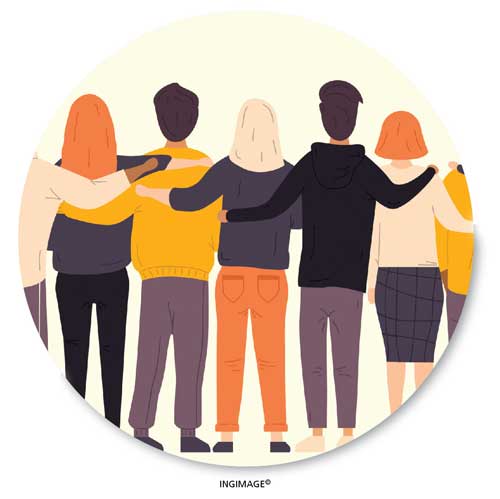PERSONAL WELLBEING
BALANCED RELATIONSHIPS
Learn to love your innermost being
BY Archana Law

How balanced are the relationships you have with those around you? Experts claim that the reason why relationships with others thrive is because of the healthy relationship that people have with themselves.
Those who have learned to love their innermost being and find their true identity tend to be more emotionally self-reliant – they enjoy mutually fulfilling relationships. On the opposite spectrum, there are others who have an unhealthy relationship with themselves – and they look to others to define themselves.
Historically, IQ has been seen as a primary determinant of success. While measuring cognitive abilities such as logic, reasoning, problem solving and linguistic skills, high IQ scores were often correlated with academic achievement and career advancement.
However, when delving deeper into human behaviour and success factors, psychologists realised that emotional intelligence (EQ) skills such as self-awareness, self-regulation, empathy and social skills enabled people to understand and manage themselves, as well as navigate social interactions and relationships adeptly.
Intrapersonnel and interpersonal effectiveness needs to be balanced between caring for others and taking care of oneself. While empathy is generally considered a positive trait, being overly empathic can often lead to emotional exhaustion or difficulty in setting boundaries.
As humans, the relationships we form with other people are vital to our mental and emotional wellbeing – and even our survival. We have an inherent desire to be close to others, connect and build relationships. Though emotional connection isn’t something you can see or measure with scientific tools and can mean different things to different people, certain hallmarks stand out.
Healthy emotional connections involve being your authentic self, feeling safe and being able to be vulnerable, having a mutual sense of compassion, feeling equally supported and enjoying your time with another person.
Given that we spend a third of our lives at work, it’s clear that good relationships with colleagues make our jobs more enjoyable. The more comfortable coworkers are around one another, the more confident they will feel about voicing opinions, brainstorming and going along with new ideas. So teamwork is essential for change, creativity and innovation.
Group morale and productivity soar when people see the fruits of working together. Instead of spending time and energy dealing with negative relationships, we can focus on opportunities instead – i.e. from winning new business to focussing on personal development.
Being able to generously give of yourself, your skills and strengths implies that you’ve taken care of your own needs and can put forth energy toward others.
On the other hand, giving too much is not the ultimate form of selflessness. Instead, it essentially comes from an inability to receive. That means you give because you think or hope for appreciation or acceptance, it makes you feel good about yourself or you feel morally obliged to do so.
Here are a few key aspects of maintaining balanced relationships.
LISTENING Attentive listening shows genuine interest in the thoughts and feelings of others. This demonstrates that you are willing to give your attention and time to understand their perspective.
Understanding and acknowledging the emotions and experiences of others builds trust and connection in relationships by demonstrating that you care about their wellbeing. Emotional connections also provide a safe space for people to express their true feelings – both positive and negative.
ASSERTIVENESS Express your own needs, thoughts and feelings clearly and sensitively. Based on mutual respect, being assertive enables you to advocate for yourself while also being considerate of others’ perspectives.
At the same time, be open to compromise and negotiation to find solutions that benefit all concerned. Flexibility makes way for adaptability and problem solving in various interpersonal situations.
BOUNDARIES Set and maintain healthy boundaries to protect your own wellbeing while also respecting the boundaries of others.
This involves knowing when to say ‘no’ and when to assert your boundaries. Reciprocate by striving for a balanced exchange of support, resources and attention in relationships. While it’s important to receive, it is also important to recognise when you need to give.
It’s okay if you prefer being alone – but attempting to form a few close relationships can contribute noticeable benefits to your mental and physical health.
The 2021 World Happiness Report declared that people who experience connections with others have greater life satisfaction, more resilience, better mental health, reduced health risks, improved physical health and stronger immune systems.




